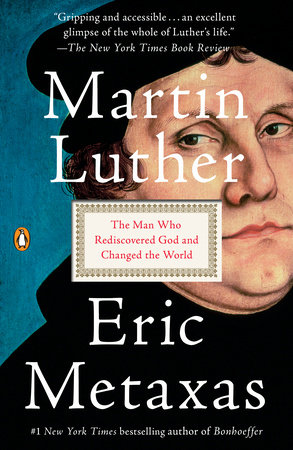Eric Metaxas: Martin Luther
 Eric Metaxas, Martin Luther: The Man Who Rediscovered God and Changed the World (Penguin, 2018), 480 pages, ISBN 9781101980026.
Eric Metaxas, Martin Luther: The Man Who Rediscovered God and Changed the World (Penguin, 2018), 480 pages, ISBN 9781101980026.
The author, Eric Metaxas, is well known as a #1 New York Times bestselling author, in part, because of his thorough treatment of the life of Dietrich Bonhoeffer in another book. Besides his prolific writing and appearance on numerous media outlets, Metaxas is a senior fellow and lecturer at the King’s College in New York City and a graduate of Yale University.
The life and achievements of Martin Luther have been the subject of many authors, films, and discussions on social media. Eric Metaxas’ account is not merely one of the many, but it uniquely covers the historical account as do few other authors. The reader is made to feel as if he or she is walking through Luther’s life alongside this reformer rather than being instructed in a lecture hall.
Metaxas clearly expresses one of his agendas for writing; that he would put to rest “the five centuries of myths” (page 11) surrounding this historic religious giant. One such myth dispelled by Metaxas has to do with the facts regarding the familiar story of the lightning bolt that caused a wayward son to commit his life to God. Luther’s life, according to the author, has been clouded because “what the world has come to ‘know’ about him is fiction” (page 3). Again and again, the author cuts through the fabric of Luther’s life and separates truth from hearsay. But in each case, he carefully offers documentation for his findings. The book is filled with footnotes and references.
The author is very thorough when accounting for every location, person, and detail of Luther’s life. It would be well to read the entire book in one or two sittings, else the reader might lose track of each of the persons involved in the narrative. Metaxas’ detail goes so far as to discuss at length the physical condition of constipation that Luther had to deal with while at Wartburg Castle, devoting three pages to the private malady (pages 244-246). He also makes a clear connection between the Church and the Empire, showing how German nationalism further escalated the reform movement.
The author offers maps, photos, sketches, and a chronology of Luther’s sixty-three-years. In addition to the twenty-two chapters, the epilogue alone stands as a monument to Luther’s legacy; including topics such as: The Free Market of Ideas, Problems with Pluralism, Conscience and Dissent, Democracy and Freedom, and Social Reforms.
Overall, Metaxas work is extremely scholarly both in content as well as in writing. It is rich in specifics, offering many personal letters, and exceedingly informative. No matter the number of other biographies that have been read, I would highly recommend this brilliant publication by the author.
Reviewed by Nat J. Saginario
Publisher’s page: https://www.penguinrandomhouse.com/books/530335/martin-luther-by-eric-metaxas/
Category: Church History, Spring 2020


